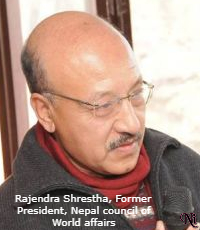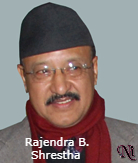Dr. Rajendra B. Shrestha
Former President of Nepal Council of World Affairs (NCWA)

Abstract:
Science, due to its international and universal nature, has the power to cross borders and connect different peoples, communities, and societies. “Science diplomacy” refers to three main types of activities: informing foreign policy objectives. Over the past decade, the use of scientific expertise to advance diplomacy has achieved a number of successes in furthering peace, security, and prosperity. Science Diplomacy is the use of scientific collaborations among nations to address common problems and to build constructive international partnerships.
Seven sustainable development diplomacy (SDD) diagnostics tools are used to identify a process that takes into account the complexity of the environment, society and the economy at multiple scales engaging all parties and their interests while also utilizing their expert knowledge.
Introduction:
Science, due to its international and universal nature, has the power to cross borders and connect different peoples, communities, and societies. Science diplomacy builds on this power of science, using science as a tool to achieve foreign policy objectives where, not only the research outcomes, but also science itself as a process and way of communicating, may serve to promote peace and sustainable development.
“Science diplomacy” refers to three main types of activities: informing foreign policy objectives with scientific advice (science in diplomacy), facilitating international science cooperation (diplomacy for science), and using science cooperation to improve international relations between countries (science for diplomacy).
Over the past decade, the use of scientific expertise to advance diplomacy has achieved a number of successes in furthering peace, security, and prosperity. Yet there have also been reversals in important areas that until recently had seen progress.
Reviewing developments in arms control, poverty reduction, global health, science and innovation policy, climate change, sustainable development, science advice in foreign ministries, and relations between countries is instructive and useful.
Politics is a more powerful force than science, at least in the short run. Scientists may have reasonable foresight in their areas of technical study, but they are not very good at predicting the future course of human events.
On topical issues during the past decade. Global health stands out. Partnerships between governmental and nongovernmental public health experts with diplomats and political leaders helped deal with challenges such as HIV/AIDS; the spread of infectious diseases such as the Ebola and Zika viruses, “bird flu,” MERS, and “swine flu” through coordinated global responses; and the rise of Science diplomacy has made important contributions Non-communicable disease (NCDs) prevention and control (Colglazier, 2018).
Likewise the Paris Agreement on the climate, concluded in 2016, was another great success facilitated by science diplomacy. In this, the partnership of the worldwide scientific community and governments through the Intergovernmental Panel on Climate Change (IPCC) was a game changer.
Implementing the Sustainable Development Goals (SDGs) at global level requires ingenuity and willingness to cooperate on all sides of the multiple global divides: be that-rich/poor, developed/developing/least developed, northern/southern hemisphere, state-led/market-led economies, democracies/non-democracies, and high science technology/low technology/ science countries.
Sustainability consisting of social, economic and environmental sustainable development is expected to be implemented as a policy package. Successful implementation inevitably means aiming for maximum efficiency and effectiveness of current social and physical infrastructure conditions as well as searching for new technologies to make these ambitious but absolutely needed goals a reality for the benefit of global survival and constructive future global development.
Poor and under-developed countries will need transfer of technology from highly developed industrialized countries and all countries will be in need of new technologies to make the SDGs become a sustained reality on a global level.
Sharing technology for the benefit of humanity can be achieved through science diplomacy.
From a global perspective, science and technology could be put to constructive use for the benefit of peace and social and economic development of the world community. The same holds for the social sciences which could also be used to achieve destructive or constructive objectives.
Science Diplomacy should be considered as a means to reduce the many imbalances and as a vehicle to lift humanity up towards sustainable growth and development.
Sciences Diplomacy could provide the needed support for the global achievement of sustainable development.
Science Diplomacy is the use of scientific collaborations among nations to address common problems and to build constructive international partnerships. Many experts and groups use a variety of definitions for science diplomacy. However, science diplomacy has become an umbrella term to describe a number of formal or informal technical, research-based, academic or engineering exchanges.
Sustainable Development Diplomacy (SDD):

Seven sustainable development diplomacy (SDD) diagnostics tools are used to identify a process that takes into account the complexity of the environment, society and the economy at multiple scales engaging all parties and their interests while also utilizing their expert knowledge (Saner, 2015).
A number of concerns have been expressed about the SDGs such as their large number, potential trade-offs, the lack of institutional mechanisms and means of implementation to achieve the goals.
With the adoption of the Sustainable Development Goals (SDGs), the international community demonstrated its renewed global commitment to sustainable development and clarified the ambitious vision for the wide range of goals to be achieved under this framework. International agreement on a set of SDGs was a significant diplomatic achievement in its own right, but implementation is an even greater challenge.
Meeting the SDGs will require multiple agreements regarding implementation policies, strategies and actions at all scales from international to local, and across sectors of society and the economy. For this reason, we utilize the term ‘sustainable development diplomacy’ (SDD) to encompass the process of negotiating and implementing the SDGs at all scales, and identify seven diagnostics to facilitate this process (Saner, 2015).
The process of implementing sustainable development requires a governance system that can match the ambition and complexity of the goals. One of the greatest challenges for sustainable development governance is the complexity of the issues and the evolving diplomatic processes required to address the linkages across issue areas, scales and actors The locus of authority no longer rests solely with nation-states based on the Westphalian notion of sovereignty. A variety of additional non-state actors are able to command authority based on the governance and implementation functions they exercise.
Another challenge is that socio-ecological systems necessitate the management of human and ecological aspects in an integrated manner. Traditional forms of diplomacy will continue to play an important role in sustainable development, but we propose the concept of sustainable development diplomacy to capture improved approaches to sustainable development governance.
Sustainable development diplomacy builds on but significantly advances the traditional understanding of diplomacy whereby agreements are negotiated to advance mutual benefit.
Sustainable development diplomacy applies the principle of diplomacy, where agreements are negotiated to advance common agendas, but is marked by several important shifts, both in the substantive content of what is negotiated and its practice or means of conduct (Shrestha, 2016).
First, SDD includes a broader conceptualization of the actors involved in diplomacy. Governance of sustainable development outcomes can emerge without the explicit consent of state authorities (unlike traditional diplomacy in the Hamilton and Langhorne definition).
Second, SDD is not understood as simply the adoption of an agreement but incorporates all phases of the negotiation and implementation of policies and programs.
Third, in terms of substantive content, we utilize the definition of sustainable development provided by the Brundtland report as the foundation for our analysis. Sustainable development is ‘development which meets the needs of current generations without compromising the ability of future generations to meet their own needs. In other words, it is a development process that can endure into the indefinite future to meet societal needs, maintain an effective economic system that manages the exchange of goods and services and an environment that can continue to supply essential resources and other ecosystem services (Shrestha, 2016).
Sustainable development diplomacy is a process that a wide variety of actors can use in their efforts to pursue sustainability goals. Therefore, we focus on actors and what they can do to steer society towards sustainable development. Most of the studies that focus on social-ecological systems are structural in nature. They identify system properties, how these properties change, and identify what these changing properties mean for actors operating within those systems.
The SDD approach does not dismiss the possible existence of trade-offs among goals but recognizes the need to make those trade-offs at appropriate scales. Given the complex and interacting nature of the SDGs, the trade-offs and synergies are a matter of contingent, contextually dependent factors. What the SDD approach offers is a framework to allow stakeholders to discuss and arrive at mutually agreeable solutions to manage that trade-offs.
As the SDG agenda moves forward, it will be important to expand on the lessons learned from the history of environmental governance to ensure that social and economic dimensions of sustainability are integrated to ensure the goals remain living, flexible, and adaptive.
Conclusion:
Hence we need to 1: reframe issues into a sustainable development context instead of framing them as environmental, social or economic problems; 2: utilize mutual gains negotiation techniques to benefit as many state and non-state parties as possible while effectively addressing the issue of concern; 3: engage multiple state and non-state stakeholders; 4: assemble relevant scientific, economic and political information to identify the underlying causes of a problem or issue; 5: create a portfolio of actions that can address the stated goals at a level of complexity that is compatible with the complexity of the problem; 6: identified the levels of political and societal organization where intervention is most acceptable and governance will be most effective and accountable and 7: instruments are living and flexible and able to respond effectively to new information and the evolving context as actions are taken (Colglazier, 2018)
References:
William Colglazier. Science Diplomacy and Future Worlds. Science and Diplomacy. A Quarterly Publication from AAAS Center for Science Diplomacy. 09.13.2018.
Science Diplomacy to support global implementation of the Sustainable Development Goals (SDGs) Raymond Saner, Centre for Socio-Economic Development (CSEND), Brief for GSDR 2015, Geneva.
Dr. Rajendra B. Shrestha. On the Second Track: The Role of Civil Society and Public Diplomacy in the Further Development and Expansion of the Shanghai Cooperation Organization. International Forum, Sochi, USSR. April 19-20, 2016.
# Text courtesy: Nepal Council of World Affairs Annual Journal, 2020.
Thanks the distinguished author Dr. Shrestha and the entire team of the editors of the NCWA journal: Ed. Upadhyaya. N. P.
